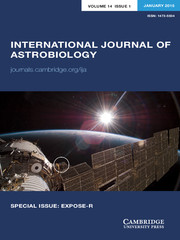Article contents
Humanity should colonize space in order to survive but not with embryo space colonization
Published online by Cambridge University Press: 25 May 2021
Abstract
The embryo space colonization (ESC) concept is an interesting, very rational and quite effective way to guarantee the survival of the human species, as long as the technology is achieved and no unforeseen complications arise during even many millions of years journey to an exoplanet. Despite these formal advantages of the concept, this paper points to a number of arguments against its validity. These arguments revolve around two issues. One is to point out that while the concept of saving the Homo sapiens species is noble and should be supported, the way of saving humanity envisioned by the ESC departs from what should be understood by the concept of saving humanity through space colonization. The second issue is to draw attention to the ethical controversies that make this concept perhaps unsuitable for implementation at all. At least some of these objections do not address the concept of saving humanity by sending adult living persons on space missions.
Keywords
- Type
- Research Article
- Information
- Copyright
- Copyright © The Author(s), 2021. Published by Cambridge University Press
References
- 5
- Cited by





